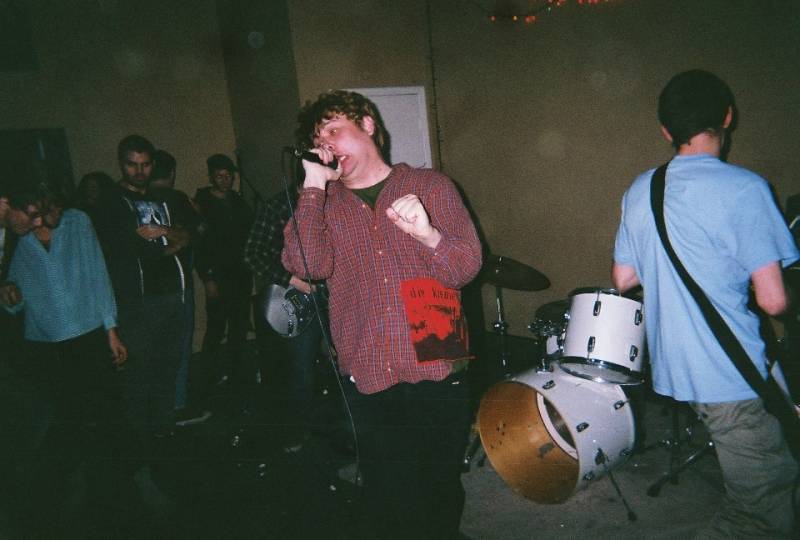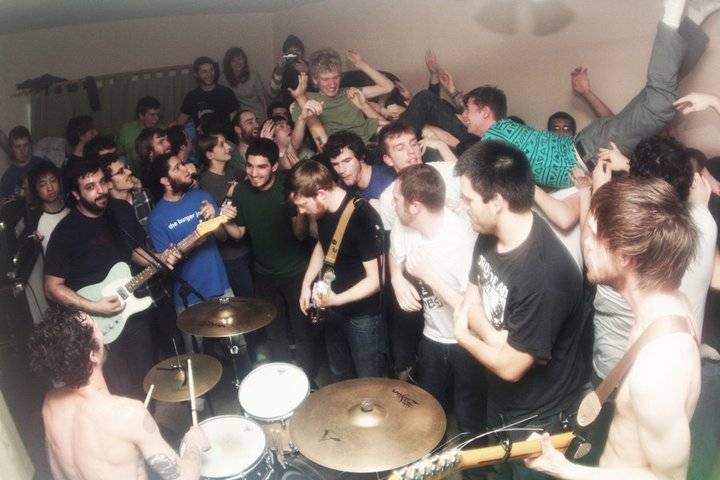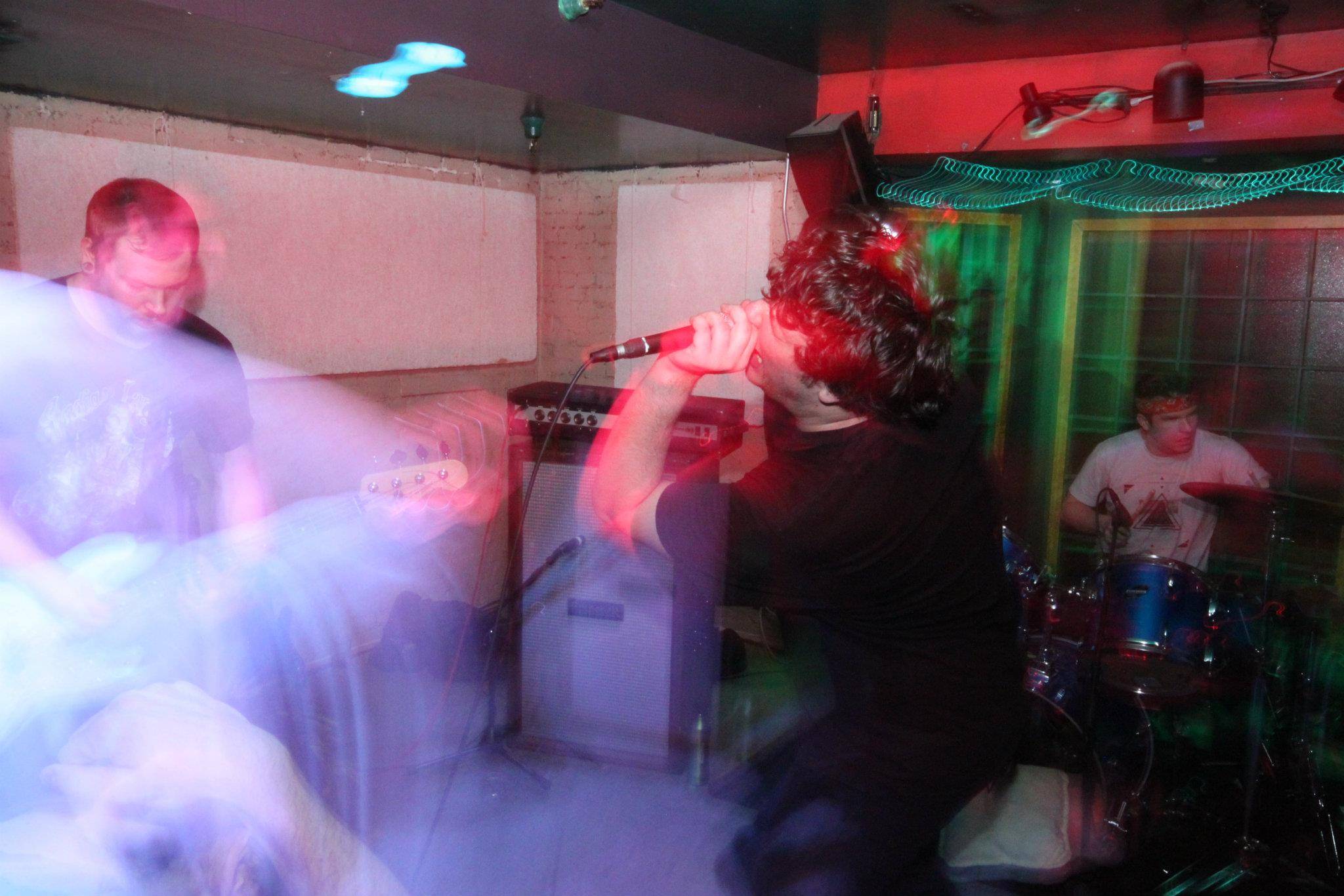There are a lot of people in the C-U music scene shaking things up. We’ve seen it happen recently with the Error Records campaign to open an all-ages venue. Or even the upcoming Skeletal Lightning Fest happening next weekend. It’s everywhere in this town and not centered on just music alone. That’s one of many great things C-U offers — the opportunity to make something happen.
As far as music goes, DIY has a long history. DIY and punk culture go hand in hand in many ways; and luckily, there’s a pretty thriving punk scene in this town that features some pretty awesome locals that are hoisting it up on a weekly basis. One of those individuals doing just that is Greg Clow.
Anyone who knows Clow understands what he’s about. There’s nothing wrong with highlighting an individual you’ve known for a while, who you think is doing something great in C-U, and who should be recognized for just that.
I took the opportunity to discuss with Clow what he does for the DIY scene in C-U, and we touched on some topics relating to his work as a musician, show promoter and booker, and talked about just being active in the area.
Smile Politely: You grew up not far from C-U in Gibson City, and went to school here, how did your involvement with the C-U music scene begin?
Greg Clow: In high school, I was in a melodic punk band called Krash Type 17 that occasionally played in and around Champaign. The kids that dug shows from surrounding towns (Gibson City, Homer, St. Joseph, Monticello, Mahomet, Paxton, Fisher, etc) formed a tight bond, probably because we were all sick of smalll town bullshit. When I graduated in 2007 and my band split up, I started The Diamond Stretch with a variety of these small town dudes. I went to EIU for a year, then transfered to the U of I in 2008.
During my time in EIU, there was a house venue starting up called Error House in Champaign that was hosting a lot of bands I really enjoyed at the time, like Gaza and Native. For some reason, Nathan from Error House was kind enough to let TDS on his shows. Since boring Charleston was an hour away from all this, moving here for school was a no-brainer. I decided to intern at WPGU in the fall of 2008 and got an opportunity to co-host the local music program, Inner Limits. This helped a lot in my introduction to the music scene that wasn’t at the houses or playing hardcore.
SP: When you started organizing those house shows, what was that experience like?
Clow: I was going to damn near every Error House during my first year at U of I. The Diamond Stretch was playing more and new bands like Commodity and Version were bringing so many new faces out to the shows. All of us going to Error Shows started to become friends with each other and with these out of town touring bands that we loved. The news came in early 2009 that Error House would be no more because a good majority of the tenants were moving out.
At that point, a handful of us got together and decided that we needed to keep this house going. We signed the lease, moved in that fall, changed the name to Terror House, and picked right back up with shows. We had some problems with the cops that winter and started back up again in Spring 2010 with a new name, Dan Aykroyd’s House. We kept it going until the last show in July of 2011. The experience of living and booking at the house was the best. With six sloppy 20-something dudes living in a house that was already starting to fall apart, we made the best of it with these shows. We were making friends with people all over the continent and providing a place for people of all ages to come see bands that we were stoked on.
The Champaign hardcore kids and the Urbana punks were finally starting to unite and swap shows with each other. People were forming friendships that have resulted in some sick bands forming and some hella awesome committed relationships. The house shows scene was not just a place to see bands, it was a friend circle. And the best part was that it was not at all exclusive, contrary to some belief. We welcomed all types as long as they were respectful. The only reason why we kept it somewhat secret was because of the city ordinances. The only bad part was it did have some effect on our personal lives. Things like roommate tension or the basement flooding or distractions from school made it kind of difficult, but that stuff is part of the experience of being young and sharing a house for the first time. You learn from all those things, so I have no regrets. I have way too many great memories of that house to think about the bad stuff.

SP: How does your involvement with the Diamond Stretch and your current projects (Laughboy, Bailout, Secular Edict) affect the way you organize shows?
Clow: It has some effect with the shows, mostly because it helps with show trades. You help a band here and they usually get you back in their town. The only setback, which can be flattering, is when the touring bands ask if your band can play the show you book for them when you’re already confirmed for another show. I hate oversaturation. If you play your town or any town more than once a month, people will get burnt out on your band. It just doesn’t seem as special anymore.
SP: You book a lot of shows at the Red Herring; how did that all come about?
Clow: The Red Herring was always an ideal place in my mind, but no one really understood how to go about booking shows there for some reason. Matt, one of the new managers there, figured out a way to make booking really easy and cheap there, so a lot of the dudes who book DIY in town jumped on it. It has been awesome working with the Herring/Channing Murray, and all the DIY people are extremely appreciative.
SP: What is the biggest obstacle for producing DIY shows?
Clow: The biggest obstacle is balancing it with your life. It’s basically a part-time job with no pay. You are your own intern. I work 40–50 hours a week as a night manager at a sub shop, and the rest of my spare time and money is spent on booking, playing, or attending shows. Luckily, punk and hardcore isn’t supposed to be about money. There is a song that came out in the late ’80s by New York hardcore band Warzone called “Don’t Forget the Struggle, Don’t Forget the Streets” with a very important message of why the hardcore lifestyle isn’t about money. You can’t put a price on a community with this much passion. You have to keep the faith. Trust me, its a worthy obstacle.
Warzone: “Don’t Forget the Struggle, Don’t Forget the Streets”
[[mp3 warzone_dont_forget_the_struggle]]
SP: How have you seen the underground scene develop through your time in C-U?
Clow: In the past five years or so, the underground scene has become so united and it rules. In my first year here, I never would have thought that the outskirts kids, the Champaign straight edgers, the Urbana punks, the UIUC transplants, and the downtownies would ever acknowledge or support one another. Now we’re helping each other with shows and even forming bands with each other. I guess it was only a matter of time, but it’s still wild to think about. It’s been really awesome watching the 17-year-old nervous kids who used to go to my house now becoming legit artists and touring the country.
SP: What are a handful of shows that have really stuck out to you as shows that have helped shape the landscape of DIY in C-U?
Clow: The show that sticks out the most to me was in the winter of 2009–2010, when The Copyrights played the Red Herring. All the opening bands were each from a little section of DIY in town. You had the Urbana punks in Alleyway Sex, the Champaign hardcore kids in The Diamond Stretch, and the new-to-town college kids in Horrible Things. It was the first time I met some of these guys, and at the point it just seemed silly that we hadn’t played shows together yet because we all had different backgrounds of DIY. I always thought of that show as the first real introduction on what C-U DIY could become. Plus, the Copyrights killed it and so many people came. Weekend Nachos at Terror House and Castevet at Dude Ranch stick out, too. I have never seen so many people excited in this town than at those shows.

Castevet at Dude Ranch, March 5th, 2011
SP: How do you feel about Error Records‘ aspirations as they are attempting to open an all-ages venue in Champaign?
Clow: I am so proud of Nathan and Error Records for getting this off the ground. I know he has wanted to do this for so long, and he is totally capable of making it successful. Our community needs a space like this, especially for the youth. It will be such a great resource for the residents of this town to explore and create art of any kind. I love how central the location is, too. And I can’t wait to be able to buy hardcore records in town now!
SP: What is the importance or significance of the DIY scene in C-U?
Clow: The importance of DIY here, and with any town, is that this is a community where you can create anything on your own terms. There are so many ways to contribute to DIY. You can make zines, host art shows, print shirts, press tapes, or anything else you can think of that contributes to providing a resource so other people can create what they want. And the beauty of it is that you can do it for cheap, or even free. DIY has lots of unconditional love in the sense that you help others because others have helped you. It’s more about inspiration than obligation. DIY teaches young people to lead by example, which I believe is the best way to lead.
SP: How do you see the scene you’re involved with changing in the near future?
Clow: I feel like DIY is going to be a very important factor for the future, and that the only change is that it will only keep growing. I truly believe that because of corporations and the mainstream media, our current system has failed us. We are due for some sort Renaissance, and I think that the DIY movement can bring us closer to that. If you want to live in a better world, just lead by example. Be inspired by art and creativity, not money and material positions. DIY is my religion, and I plan to keep the faith.








